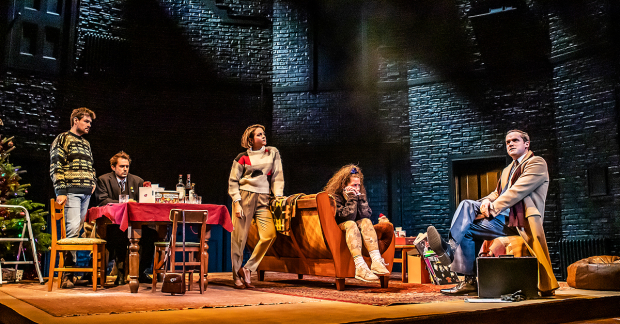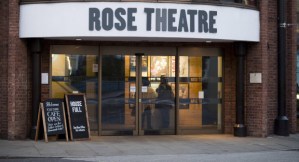Review: Valued Friends (Rose Theatre Kingston)
Stephen Jeffrey’s 1990 play is revived at the Kingston play

© Pamela Raith
Now here's an odd play. The late, great Stephen Jeffreys' near-30 year-old drama, about four quirky mates living in a west London flat together in 1983, doesn't initially feel like it has the stakes to fill the main stage on Kingston's Rose. The plot essentially covers a near half-decade with the group as they go through the motions of buying out their rented pad, outwitting their pesky landlord, having career crises and dealing with the angst of will-they-won't-they romances. It's like a twee version of ten seasons of Friends condensed into a 150-minute experience – "The One Where The House Prices Keep Going Up".
Michael Fentiman (who did a brilliant job transforming Amélie into a charmingly quaint musical) throws all the bells and whistles at the production of what is fundamentally a one-room drama – soundscapes ripple around the Rose auditorium, spotlights silhouette the cast and dates and years flash by as the 80s progress and scenes move inexorably onwards. It's a manic reflection of a turbulent decade and while slightly out of keeping with the softer tone of Jeffreys' script, certainly keeps the scenes ticking over with some forward propulsion.
The play first premiered at the Hampstead Theatre in the early months of 1990 – a new decade, just as the end of Thatcher's reign came into view. It now often feels outdated – a reflection on a period long gone and a set of circumstances that no longer exist. But sometimes you can see hints of a prologue to the housing issues of the modern-day (young people being unable to jump on the ladder, property remaining in the hands of the elderly as they live longer etc) – Jeffreys goes to great pains to show that renting is a sucker's game during a property boom.
Where the play excels is the personal relationships, the jostling of the quadrangle as they tackle romance, rent disputes, gardening (no joke, there is a groundbreakingly fresh but fleeting turn from Nicolas Tennant as builder stroke philosopher Stuart who helps the team do up their flat) and underlying pain of growing older.
There are also some solid performances – a brilliant verve and quiet melancholy shines through Catrin Stewart's Marion, who suspects she's spent most of her adult life convincing herself that she hasn't made a major mistake, while Sam Frenchum plots a neat through-line from wannabe wastrel to unwitting family man Paul. Natalie Casey has less to do as the floundering comedian Sherry, though gets something of a heart-wrenching crescendo in the second act. It's a show not without its moments, but never really justifying its presence.


















